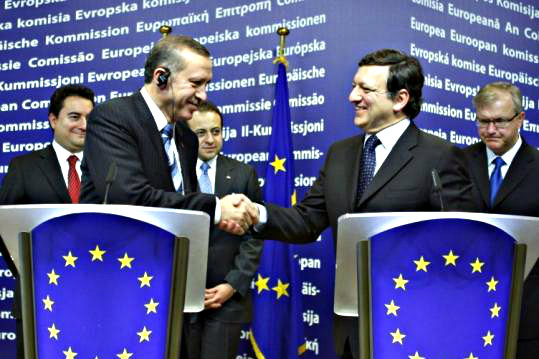Turkey: Military establishments to be abolished or continue as private companies
Military companies which are a burden on the shoulder of the defense industry, one of the sectors to benefit from the incentive package announced by the government last week, will be eliminated over time despite resistance from the Turkish Armed Forces (TSK) and there are plans to make Turkish Aerospace Industries’ (TAI) go public to professionalize the institution. Military companies will either be abolished or they will continue to serve as private companies.
Undersecretariat for the Defense Industry (SSM) Undersecretary Murad Bayar has explained the plans for downsizing military firms to Today’s Zaman. SSM makes 90 percent of the arms procurement in Turkey.
“There will be competition in the defense industry. The important thing for us is efficiency. In some sectors, there cannot be several companies which makes production. TAI will only be active in aeronautics. Otakar will be our only firm which produces tanks. In the EU, companies get united and establish a consortium. The EU, which has 27 members, has only three aeronautics companies,” Bayar said.
The Foundation to Strengthen the Turkish Armed Forces (TSKGV) has shares in 18 military firms. It is not know how much TSKGV transfers to military projects. The supervision of the TSKGV and its spending cannot be made because there is no such request from the Parliament
When asked during an interview to Zaman daily on March 28 about the claims companies such as TAI, Aselsan and Havelsan, which are tied to TSKGV are not managed well, Defense Minister İsmet Yılmaz signaled that there will be a more competitive environment for these companies from now on and arms procurements will be made through tenders.
Bayar said upon orders from Minister Yılmaz, the ministry has launched efforts to open the defense sector to the private sector and make it sure that a military firm stops production when a private firm begins production in the same area. Some small-sized TSKGV firms will either merge either with a private firm or they will be closed down or continue to serve as private firm. Bayar also said that TAI will become a more professionalized institution when it goes public.
New strategy in critical military technologies
Countries, which have advanced arms technology, develop economically through the exports of the arms. Turkey is one of the countries which purchases arms most and makes a high amount of military spending. Over the past years, Turkey has given weight to the production of the arms at home, which helped it to import less arms.
The rate of Turkey’s arms procurement from abroad was 85 but this has fallen to 48 percent thanks to domestic arms production. Bayar said Turkey’s dependence on imports is still around 35 percent in critical military technologies. He said in order to eliminate the discrepancy in this sector, SSM has adopted the “Cradle to Grave,” policy, beginning from the operational requirement definition going through feasibility studies, design and development, production, testing, delivery to service and in service support, modernization, upgrade to full life cycle of a weapon system will be undertaken.
“ SSM plans to implement this policy (Cradle to grave) under a program concept and under the responsibility of industry, utilizing the capabilities of existing military maintenance facilities. But there will be no new investments to be made on these facilities. Over a long term, there will be a transition to a defence industry which is more privately owned, ” Bayar said.
Under the new strategic plan, specific measures will be taken to assist industry to include the establishment of national test and evaluation centers and a satellite assembly facility. As part of this plan, tank test center is built and unveiled on 29 March at local Otokar facilities in Adapazarı, near İstanbul. The test center having the capability to execute tests that require commercial and military confidentiality, is built as part of Altay main battle tank (MBT) production project that Otokar is the main contractor.
The total value of the contracts for around 300 military projects that SSM signed last year was about $27.3 billion. Turkey spends $4 billion per year for arms acquisition projects half of which remains in the country as the indigenous production ratio reached to 52 per cent. The new defense industrial strategic plan features a target of national military exports of $2 billion per year by 2016.
08.04.2012
SOURCE: TODAYS ZAMAN



